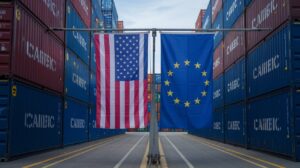President Donald Trump’s 25% auto tariffs are set to increase car prices nationwide, putting pressure on both consumers and the auto industry. The tariffs, which apply to imported cars and auto parts, are aimed at boosting domestic manufacturing. However, industry experts warn that the move will lead to significantly higher costs for American car buyers and could have lasting economic consequences. This article explains how these tariffs will impact car prices, the economy, and consumer choices.
How Much Will Car Prices Increase?
Trump’s 25% auto tariffs will have a significant impact on the cost of vehicles in the U.S. The increase in car prices will vary based on factors like the vehicle’s origin, brand, and manufacturing process.
Projected Price Increases by Vehicle Type
| Vehicle Type | Expected Price Increase | Reason |
|---|---|---|
| Imported Cars | $5,000 – $15,000 | Higher tariffs on foreign-made vehicles |
| Domestic Vehicles | $3,000 – $8,000 | Increased cost of imported parts used in assembly |
| Electric Vehicles (EVs) | 10% – 15% price hike | Dependence on imported batteries and tech components |
- Luxury Brands: Companies like BMW and Mercedes-Benz will likely see the highest price jumps due to their reliance on foreign manufacturing.
- Used Cars Market: With new car prices rising, demand for used cars may surge by up to 20%, leading to higher resale values.
How Will the Economy and Consumers Be Affected?
The effects of the tariffs extend beyond just car buyers. The entire economy could experience inflationary pressure and shifts in consumer behavior.
Key Economic Impacts of Auto Tariffs
- Inflation Increase: Analysts predict a 0.4% rise in the overall U.S. inflation rate, affecting household expenses.
- Lower Consumer Confidence: The cost of living may rise, making Americans more hesitant to make major purchases like vehicles.
- Higher Auto Loan Rates: With rising car prices, financing a vehicle may become more expensive due to higher loan amounts and interest rates.
How Are Automakers Responding?
Major car manufacturers, both domestic and foreign, have raised concerns about the impact of the tariffs.
- Ford & General Motors: Warn that price hikes are inevitable due to increased costs of imported parts.
- Toyota & Honda: Considering shifting future investments away from the U.S., which could impact American manufacturing jobs.
- Tesla & Other EV Makers: Concerned about higher costs for essential battery components sourced from abroad.
This uncertainty could lead to job cuts, production slowdowns, and potential relocation of factories, affecting American workers.
What Should American Consumers Do?
Given the rising prices, American consumers need to be strategic about purchasing vehicles in the coming months.
Best Strategies to Save Money on a Car Purchase
- Buy Sooner Rather Than Later: Car prices will rise gradually; purchasing before tariffs take full effect can save money.
- Explore Used Car Deals: The pre-owned car market is expected to grow, offering a more affordable alternative to new vehicles.
- Consider Leasing: Leasing might be a better option if you want to avoid high initial costs and can wait for potential tariff adjustments.
- Check Manufacturer Incentives: Some automakers might offer discounts or incentives to offset higher prices temporarily.
- Secure Low-Interest Loans: Locking in a low APR financing now could help reduce overall costs in the long run.
Conclusion: The Long-Term Impact of Auto Tariffs
Trump’s 25% auto tariffs are poised to reshape the U.S. car market, with price hikes affecting consumers nationwide. While the administration’s goal is to strengthen domestic manufacturing, the immediate financial impact on American buyers cannot be ignored.
If inflation rises and auto sales slow down, further economic consequences may follow, including potential job losses and reduced investment in the U.S. auto sector. Staying informed and making strategic purchasing decisions will help consumers minimize the financial burden of these tariffs.





